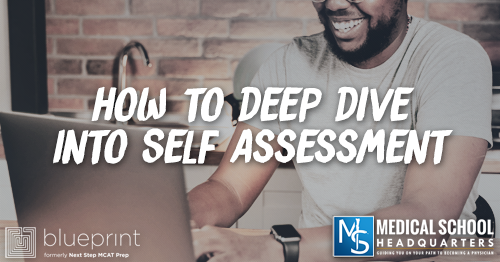Apple Podcasts | Google Podcasts
Session 272
Today, we meet Evan, a new Blueprint MCAT instructor. Let’s hear about his hot takes on the MCAT. If you want to follow along on YouTube, go to premed.tv.
Listen to this podcast episode with the player above, or keep reading for the highlights and takeaway points.
[02:02] The Keys to MCAT Success
Teaching MCAT now for a little over a year, the one thing Evan did hit on successfully when he was studying was implementing a lot of practice into his study plan. He was very determined to make sure he was attacking whatever weaknesses he noticed. He was methodical and meticulously hitting his weaknesses.
“Practice means an active type of practice that is engaging, and you're putting together all of the skills in a very test-like way.”Click To TweetThe MCAT is a long, daunting, standardized test. You’re doing lots of critical reading of potentially dense and convoluted passages. You’re answering questions that are requiring you to synthesize information from the passage you just learned and outside information lots of times.
Emulating those same skills of critical reading, critical thinking, and pulling together new and old information is the best way to practice those same skills.
Glazing your eyes over a textbook or idly clicking through Anki is not really testing and flexing those muscles that you use in critical thinking. Maybe it’s helpful for some memorization stuff. But it’s not going to get you all the way there to the skills that you need for testing.
[04:39] When to Take Your Diagnostic Test
Evan says you have to know where you’re at and be able to objectively assess your study plan at every point, especially at the beginning. See where both your strengths and weaknesses apply. That’s going to be the roadmap upon where you build your study plan.
That’s something you have to know as early on as possible to then tailor your study plan. It allows you to put the right amount of time towards each skill in each different section that you should be addressing.
Ultimately, you want to get the highest score possible.
Ego Studying
There’s a thing called “ego studying” where if you just keep on practicing a section over and over again, you’re still going to be great at it. But there’s a marginal gain that can be made there versus another section that you actually have as a weakness that you could improve on.
'That's where the strength of a diagnostic – it's a diagnosis where those weaknesses might lie.'Click To TweetIt’s Just a Test
You just have to go in take it and just look at that score and not make it mean anything. It doesn’t mean that you’re dumb. It doesn’t mean that you’re not going to do well on the MCAT. It doesn’t mean that you’re not going to get into med school. It just means that it’s your diagnostic test. That’s it.
Students tend to tie their self-worth to their exam scores. Even the people who write the MCAT and place a lot of value on this exam have never in any way said this is a measure of intelligence.
All that’s trying to measure are some critical thinking skills. This test is just a test. And especially for the diagnostic test, this might be the first time you’ve ever seen a test like this. That is not at all indicative of whether you’re going to get into medical school or not. It’s a tool that should hopefully enable you to see where you’re at and what progress you need to make.
[08:10] The Biggest Mistake Students Make
Evan says that a lot of students mistake the overall aim of the MCAT. In undergrad, you do things test by test every few weeks or every few months. You just memorize it, and then forget it. The MCAT is nothing like that.
'The MCAT is a test which takes together three years of undergraduate classes and expects you to have a foundational understanding of all of that.'Click To TweetThe level of re-studying and revisiting things constantly and incessantly is so much different than what you see for a test you might cram for one of those unit tests you were conditioned for throughout undergrad or high school.
You have to relentlessly review it until you get as good as you can with it. And that requires some kind of perspective change.
[10:42] How to Get Better at CARS
'The MCAT, in general, is very, very concerned with testing your critical reading, critical reasoning, and analysis skills. CARS is only that.'Click To TweetThe science aspect of the MCAT is incorporating bits of your content knowledge from what you’ve learned in your years in undergrad. But honestly, Evan says, that’s still only secondary to the critical analysis. And CARS is completely stripping away that content bit.
And so, all that’s left is working on your strategies and your approach to the passages, critical reading, and answering questions. Because there is no content knowledge that can either help you or hinder you in that respect. It’s the most distilled form of what the MCAT wants to test in some ways.
[12:28] Final Words of Wisdom
The MCAT is a long test. There are going to be days where it’s really difficult, and some days where it’s going really well. The thing that helps the most is being consistent. It means having a very good idea of when you’re going to study and what you’re going to study, and most importantly, when you’re going to rest as well. This is a very neglected piece.
Sometimes students can get just so wrapped up in it. And they forget to make sure they’re studying in the best possible shape. Being well-rested, in a good mood, and motivated is very important in doing well.
'We're not MCAT machines. We're people who are studying for the MCAT. So we can't neglect that people part and completely cut out everything else.'Click To TweetSo we need to make sure that we’re taking care of ourselves. That way, when we step into the room to study for the MCAT, we are as ready and motivated as possible to maximize that effort we’re putting in.
Links:
SEARCH SITE
SEARCH SITE
LISTEN FOR FREE












